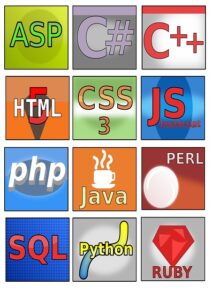
Why Are Programming Languages Seen as Driving Forces of the Digital World?
Just like people use human language as basic means of communication, computers need programming languages to receive the message from the outside world and react to it. Thus, programming languages are sets of coding symbols and structures with their own syntactic rules. They contain various expressions and serve to solve different tasks required by the users. There come more detailed explanations on why programming languages play such an important role in the digital world.
How can we categorize programming languages?

As there are numerous varieties of programming languages, all of them meet different needs of the users and utilize different types of generating and processing the data and fulfilling the required tasks.
All programming languages can be divided into two general groups: structured programming languages and object-oriented languages. Structured programming languages operate on the basis of logical relationships. Object-oriented languages tend to reflect real-life language circumstances. In other words, they refer to objects, classes, attributes, inheritances, etc.
Both groups of programming languages are crucial for computer functioning since there are no relationships without real-existing instances and vice versa.
They are a mediator between users and the computer
Once a user types into a certain command, the programming language is there to put the machine into action, to process the information which has been put in, to structure it by a set of strict rules, and come up with the most precise answer or solution. To some extent, programming languages are responsible for the speed by which the computer processes the necessary operation.
Since there is a general tendency to accelerate computer processing, that is to say, to put calculating operations at a higher speed, programming languages are there to offer their further development and to implement the key elements for better efficiency. Then, programming languages are primarily written in a simple form, yet able to meet the complex needs of users. They start tackling the problem with a simple solution and advance gradually to more complex answers if needed. Just like human language evolves when the human brain bumps into a seemingly harder issue, programming languages follow a similar path.
It’s because they exist that we have software that we use today

Generally speaking, programming languages are responsible for all the software and programs which come into existence: virtual reality, online games, Uber app, anti-virus, scheduling software, etc.
As the needs of the general public grow each day, there come various programming languages, a few of which seem to be already outdated. The famous programming languages are HTML, Java, JavaScript, C++, Phyton, and many more.
Today, there are more than one hundred programming languages, and each one of them has brought about some innovation into the programming world.
Since more and more people are becoming interested in programming, both as their pastime and as their profession, it is possible that programming languages will shape people’s way of thinking and concept structuring. If we make a parallel to human language and its evolution, human language has a great influence on the point of view of interlocutors. Therefore, programming languages may have a similar impact on human reasoning in the sense that they might become more literal and plastic. There remains a hope that the evolution of programming languages will bring more benefits to our reality than harms it can cause to human nature.


